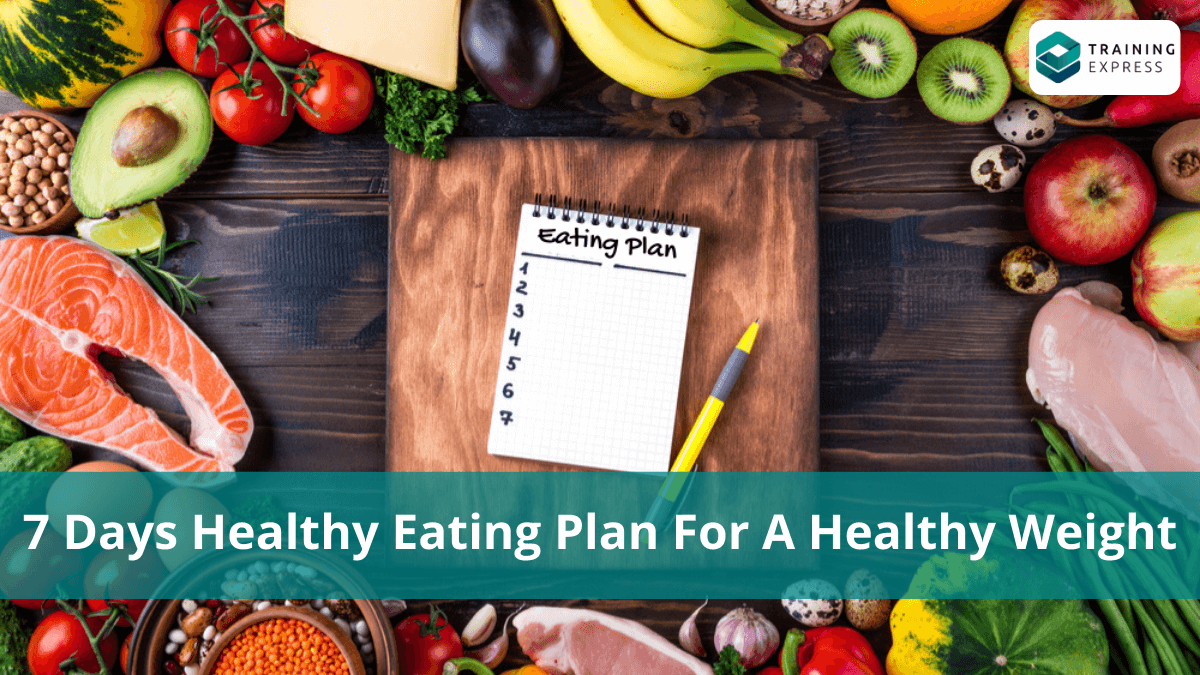
Are you worried about your health and looking for a healthy eating plan to attain a healthy weight? Whether you are underweight or overweight (obese), you can get back into a healthy life with a healthy weight if you follow this easy 7-day healthy eating plan.
So, continue reading and learn everything you need to know about a proper healthy eating plan.
Do you know what the most important thing that can protect your health is? The answer is, eating a healthy, balanced diet. Because by choosing a healthy eating plan and becoming physically active, you can prevent up to 80 per cent of premature heart diseases and stroke.
A healthy eating plan can lower your risk of heart disease and stroke by:
- Improving your cholesterol levels.
- Reducing your blood pressure.
- Helping you manage your body weight.
- Controlling your blood sugar.
What is healthy eating?
Healthy eating refers to a balanced diet that includes eating a wide variety of foods in the right proportions. And if you consume the right amount of food and drink, you’ll achieve and maintain a healthy body weight. Also, it means to add more plant-based foods rather than highly-processed or ultra-processed foods to your daily meals.

Whether you want to lose or gain weight or achieve a healthy weight, a healthy eating plan is the best way.
What is a healthy weight?
There are some common questions that people of all ages ask themselves at any point in their lives,
- How much should I weigh?
- How do I know if I have a healthy weight?
- Is a healthy weight the same for everyone?
- If I gain or lose weight, will I still stay healthy?
The answers to these questions are pretty simple and lie within the understanding of the key question: what is a healthy weight?
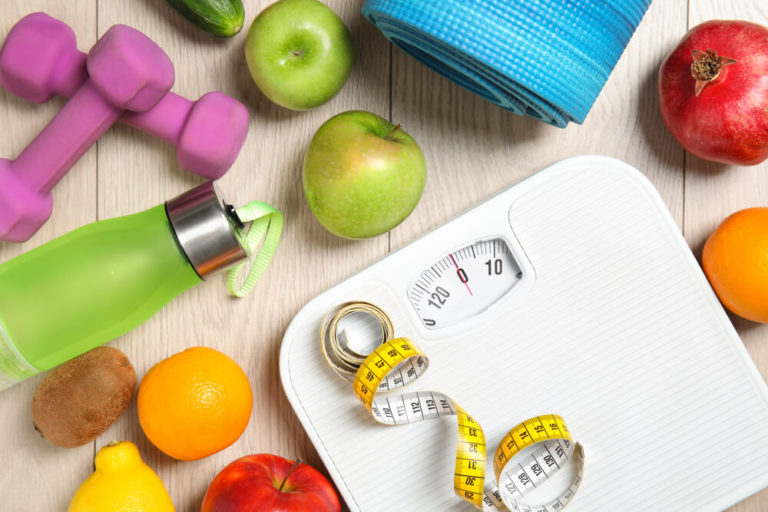
A healthy weight is something that can help you get the most out of your life. It’s a weight that can make you feel better, live longer and lessen the risk of chronic diseases. In the same way, if your body has less amount of body fat in proportion with your age, height, sex and body shape, you have a healthy weight. Moreover, you’re less likely to develop serious health problems, including high blood pressure, heart diseases, type 2 diabetes, breathing problems, and certain cancers.
However, not everyone with extra weight develops health problems. Because a few extra pounds might not affect your current health, but a lack of management could lead to future health problems.
You can understand the concept of a healthy weight by your body mass index (BMI).
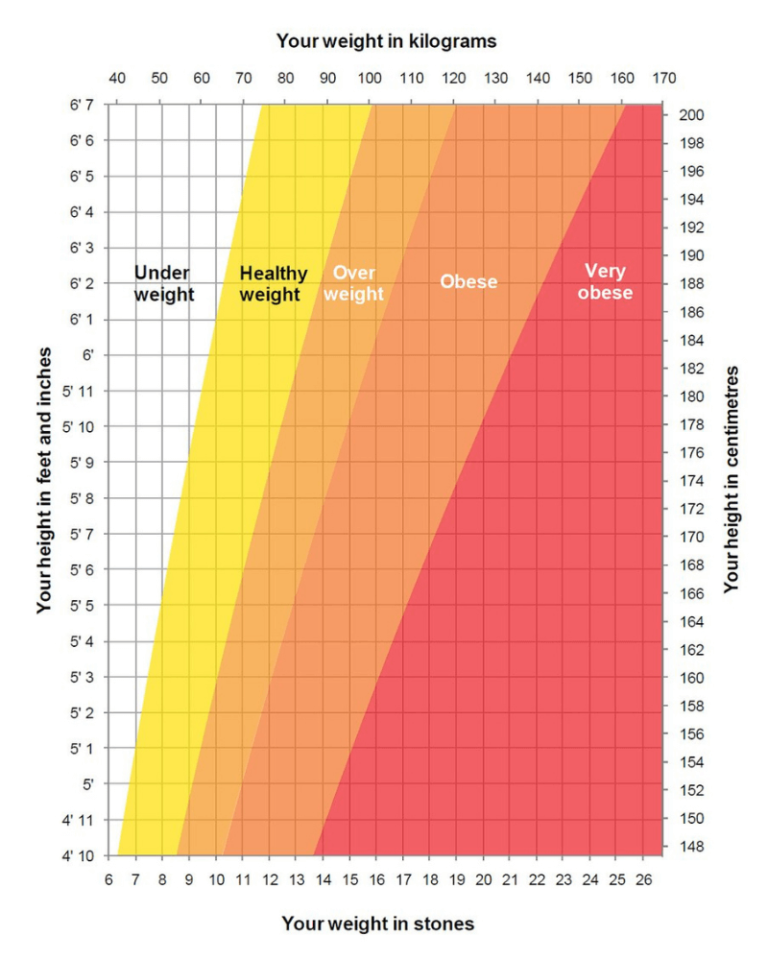
Note: BMI should not be used to calculate health risks in pregnant women, people with a muscular build and the elderly. These BMI ranges don’t apply to children or people under 18.
Why should you eat healthily?
Eating a healthy, balanced diet doesn’t mean you’re turning your daily life into a complicated and restrictive scheme. It’s more like becoming aware of what your body needs.
You can choose a variety of foods from all the major groups, including fruits and vegetables, lean proteins, dairy products, grains and cereals and good oils and fats. However, you have to cut back on less nutritious, higher fat, processed foods. But why should you maintain such an eating plan? Here are some reasons that’ll make you strive for a healthy eating plan.
1. Improved heart health
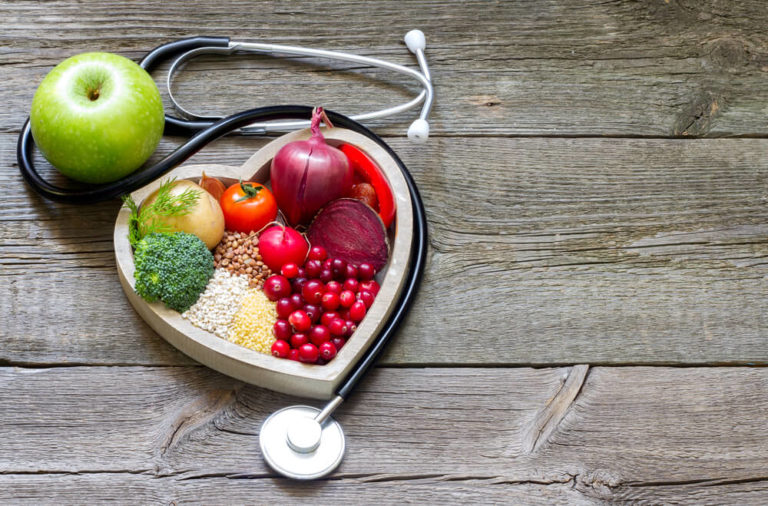
An estimated 17 million people die of cardiovascular diseases every year. An unhealthy diet and physical inactivity are the main risk factors behind diseases like heart attacks and strokes. However, a healthy eating plan can reduce these risks. If your meal contains:
- Olive oil – contains heart-healthy antioxidants. It can help to protect your blood vessels by lowering cholesterol levels.
- Salmons – contains omega-3s. They may reduce the risk of heart rhythm disorders and lower blood pressure as well.
- Tuna – also contains omega-3s.
- Walnuts – contains omega 3s, monosaturated fats, and plant sterols; helps to lower cholesterol levels.
- Almonds – also contain plant sterol and heart-healthy fats. Almonds may help to lower bad LDL cholesterol.
- Lots of fruits such as apple, oranges, blueberries, cherries. Fruits are rich in cholesterol-fighting antioxidants, fibre pectin. They can help to protect blood vessels and control blood pressure.
2. Weight gain or weight loss
Based on your BMI, if you’re overweight, you need to lose extra pounds. And if you’re underweight, you need to gain weight. However, both of these cases will require you to eat healthily. Eating low-calorie and highly processed foods, high fibre grains, nuts, seeds and fruits will provide your body with all the nutrients it needs. Likewise, neither you will need to cut off your diet nor resort to foods that offer calories with less nutritional value.
3. Reduced risk of type 2 diabetes and cancer
Obesity and eating an unhealthy diet are two major risk factors for developing type 2 diabetes and cancer. Although there isn’t enough evidence that any particular foods can prevent cancer, healthy eating can reduce your cancer risk. Because if you increase your intake of nutritious foods, it can minimise the risk of having type 2 diabetes.
4. Healthier skin and hair
A healthy diet will supply the necessary nutrients your skin and hair need. It may even avert wrinkles and help you look your best.
5. Role modelling for kids
It’s unfair to ask your kids to eat broccoli if you don’t eat anything green yourself. So, you must set examples for your kids. If you follow and maintain a healthy eating plan, your child will follow you too. Moreover, you’ll be able to explain to them how important it is to have a healthy diet.
7 Days healthy eating plan
You may already know about foods that can improve your heart health and reduce the risks of chronic diseases. But you need to make a plan that’ll include which foods you’ll eat every day on breakfast, lunch and dinner. Moreover, you can make a weekly eating plan that is both nutritious and affordable.
Monday
What’s better to start your day off than with a bowl of porridge made with skimmed milk? It can’t get any more nutritious than this, right? Here are other nutritious and delicious foods you can add to your breakfast.
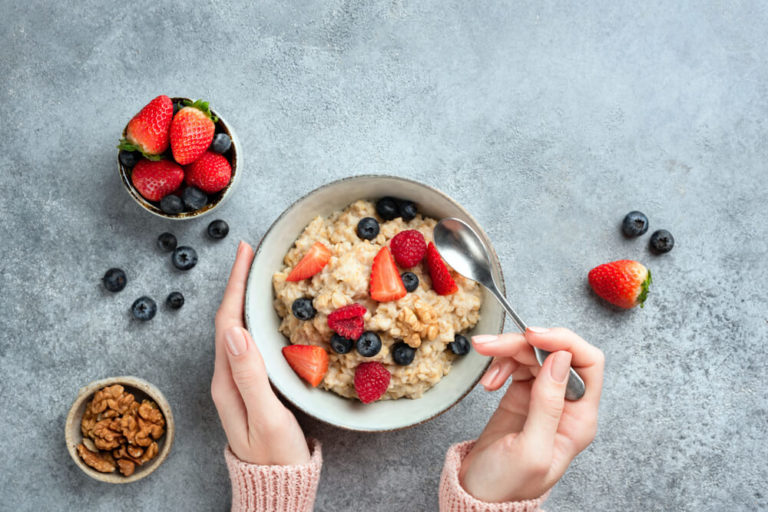
Breakfast: Porridge with berries and nuts; cereal; banana, and a glass of pure, unsweetened orange juice.
Lunch: Wholemeal roll with unsaturated fat spread, lentil soup.
Dinner: Baked potato with salmon and frozen peas.
Snacks: Low-fat fruit yoghurt or yoghurt topped with sliced strawberries.
Tuesday

Breakfast: Wholegrain toast with a boiled egg and orange juice.
Lunch: Baked potato with beans; salad; oatcakes with low-fat cream cheese.
Dinner: Vegetable goulash, broccoli and brown rice.
Snacks: Smoothie: skimmed milk, low-fat yoghurt, frozen berries.
Wednesday

Breakfast: Egg whites scrambled with olive oil; orange juice.
Lunch: Salmon and cauliflower fishcakes with dill yoghurt dip and mashed peas.
Dinner: Spaghetti bolognese with salad or spinach salad with light balsamic vinaigrette.
Snacks: Unsalted nuts; ricotta cheese with raspberries and chopped pecans.
Thursday
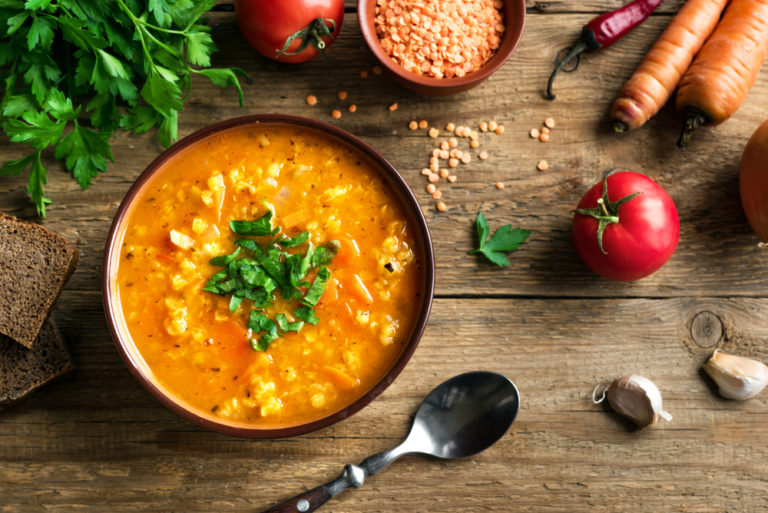
Breakfast: Wholegrain toast with sunflower spread, honey and banana; orange juice.
Lunch: Lentil soup; Asian cod with stir-fried greens.
Dinner: Vegetarian pizza with salad and baked potato
Snacks: Vanilla yoghurt with sliced apple and chopped walnuts.
Friday

Breakfast: Toasted muesli with skimmed milk, almonds, coconut or banana; orange juice
Lunch: Sandwich made with reduced-fat cheddar-style cheese and salad, bread and unsaturated fat spread or roasted veg or freekeh and feta salad with yoghurt and mint.
Dinner: Cottage pie with peas and carrots.
Snacks: Oatcakes with low-fat cream cheese.
Saturday

Breakfast: Porridge made with skimmed milk; banana; orange juice; peanuts; apple; pear.
Lunch: Carrot and parsnip soup; omelette wraps with salmon, feta and herbs.
Dinner: Tuna pasta bake; broccoli;
Snacks: All-fruit raspberry sorbet with chopped walnuts.
Sunday
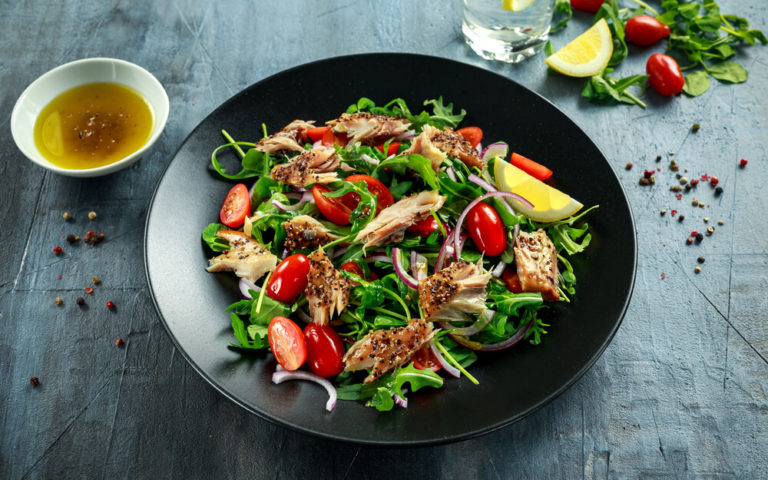
Breakfast: Fruity French toast; muesli; banana; peanuts; carrot sticks.
Lunch: Sausage whirls with apples and mash; chicken and vegetable traybake.
Dinner: Mackerel salad with vegetables.
Snacks: Vegan rice pudding with pear & berry compote.
This 7-day healthy eating plan will help you get a healthy weight. However, you can always add your preferred list of foods on your 7-day plan that’ll follow every week for several months or until you achieve your goals.
Keep in mind that you have to eat three meals and two snacks every day. So, you should try to balance each dish with 45 per cent carbohydrates, 30 per cent protein and 25 per cent healthy fats.
How to eat healthily to lose weight?
Once you’ve prepared your 7-day healthy eating plan, you need to stick to it. You can enrich and diversify the nutrition in your healthy eating plan if you want, to make it more delicious and satisfying. However, you need to balance the amount of energy you get from food and drinks. You also have to fuel your body with the right nutritions so that your health doesn’t deteriorate while focusing on losing weight.
Below are some tips that’ll you build a healthier relationship with your 7-day healthy eating plan.
Cut off the carbs and calories
You need to ditch the foods packed with calories and saturated fat (e.g. candy) and replace them with foods that contain important vitamins and minerals (e.g. vegetables and fruits).

In the same way, you need to cut off carbohydrate-rich foods that can cause you to gain more weight. Because only insulin can burn carbohydrates in your body. When you consume carbohydrates (rice, pasta, bread, French fries etc.), they enter your bloodstream as glucose. And then, your body releases more insulin to help with the influx of excess glucose. Insulin does two things actually:
- Prevents fat cells from releasing fat that our body needs to burn as fuel.
- Creates more fat cells to store everything that your body can’t burn off.
As a result, your body gets into this cycle, eventually making you consume more carbs and gain weight.
Cut down on sugar and refined carbs
Consuming unhealthy amounts of sugar and refined carbohydrates such as white bread, pizza, pasta, white flour, pastries, white rice, and sweetened breakfast cereals will add excess fat to your body.
Avoid fad diets
A fad diet refers to trendy eating practices that promise a dramatic result. However, these diets are unhealthy and can make you sick. Typically, a fad diet may include low-calorie foods or an unusual combination of foods. Although it can help you lose weight initially, soon, you may get fed up and stop the diet causing you to put the weight back on.
In addition, some fad diets recommend cutting out foods like meat, fish, wheat or dairy products. It could prevent you from getting the important nutrients and vitamins your body needs.
Start healthy eating
You should start a Mediterranean diet or turn to a super quick and easy keto diet recipe that is low on carb and has moderate protein that can help you burn fat more effectively. It also has many benefits for weight loss and overall health.
How to stick to a healthy eating plan?
Maintaining a healthy eating plan and making it your lifestyle can be challenging. You can’t just give up on your plan before seeing the results you wanted. Similarly, you shouldn’t let your healthy eating plan go out the window around the holidays, for instance, when there’s a party or function at home or work full of unhealthy foods, or when you go out with your friends to eat. There are many ways to get off a diet. However, here are a few tips that can help you stick to your healthy eating plan.
Set SMART weight-loss goals
Losing weight doesn’t happen overnight. You need to set goals based on your BMI. If you make your healthy weight gain goal a S.M.A.R.T. (Specific, Measurable, Attainable, Realistic, Time-bound) one, it’ll map out exactly what you need to do and how to do it. For example, S.M.A.R.T goal is, “I will exercise enough to burn 500 calories every day to lose 1 pound this week.”
Specific – Rather than simply saying, “I’m going to lose weight by exercising more,” you’ve specified how many calories you’ll burn.
Measurable – You need to keep track of your progress each day. Make sure you have a device that’ll keep track of the calories you burn, so you’ll be able to know when you succeed.
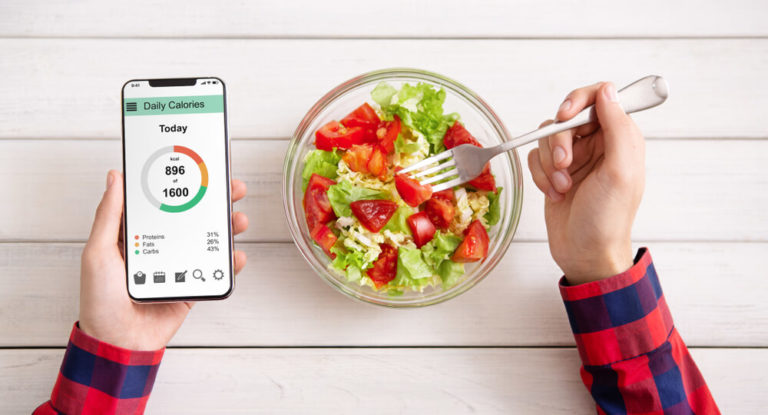
Attainable – Since you want to burn 500 calories every day through exercise, make sure you can actually do it. If it’s not attainable, then adjust it. Let’s say 400 calories a day.
Realistic – You must not plan what you can’t achieve. For example, losing 5 pounds in a month while maintaining a busy work-life schedule. It can have an adverse effect on your health. So, you should instead take fewer steps, e.g., “I’ll lose 2 pounds this month”. Your progress might be slower, but at least you’ll be achieving your goal.
Time-bound – It’s easier to commit to a goal and be successful if you do it for a set amount of time. If you fail to meet your goal, you need to change your action plan or adjust it.
Setting a S.M.A.R.T. healthy weight gain goal will help you track your progress as well. You can review your progress and identify the things you can do well and the things you struggle with.
Control emotional eating
We don’t always eat just to satisfy hunger or to get a healthy weight. Sometimes, we turn to food when we’re either stressed or anxious. Stress-eating can wreck your healthy eating plan, and you’ll pack on the pounds.
If you reach for comfort food, for example, snacking in front of the TV at the end of a stressful day, it won’t do you any good but sabotage your weight-loss efforts.
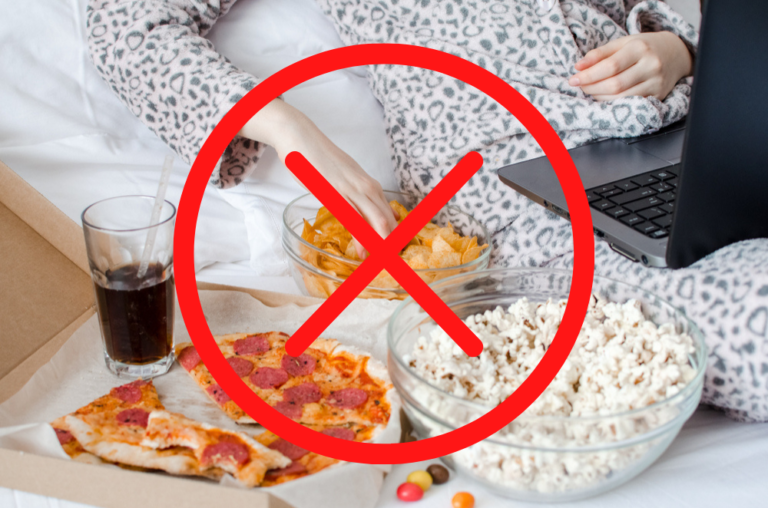
Therefore, you should recognise your emotional eating triggers. When you are stressed, low on energy, lonely or bored, you should find healthier ways to calm yourself instead of going to the refrigerator. Moreover, avoid turning to food for comfort or relieving stress which can easily derail your healthy eating plan.
Make it your lifestyle
Successful healthy weight management is a lifestyle, and your plan to achieve it should incorporate the principles of healthy eating and active living. Consequently, you can combine these habits to enjoy your life in a healthy way.
However, if you change only your diet or become physically active without eating healthier foods, it’ll not be as productive as doing both simultaneously.
Stay motivated
Motivation is the key to any achievement. Implementing your 7-day healthy eating plan for months or even for a year to maintain a healthy weight requires strong will power. So, you can seek out support from your family, friends or a support group if you want to get the encouragement you need.
Conclusion
While there are many ways to lose weight, finding a healthy eating plan and sticking to it accordingly is the best way to ensure successful weight loss.
Remember, focusing on healthy foods, cutting back on extra carbs and added sugar
and making a plan that works for you are just a few ways to get healthier and happier.
We hope this article is helpful enough to reach your healthy weight goal safely and sustainably.
Read more on our blog
- Lots of Likes on Instagram: How You Can Quickly Increase Popularity
- Why You Should Use Photo Background Removers For Mobile Devices
- Maximizing ROI: 11 Strategies For Efficient Advertising Spend
- How to Keep Your Data Safe While Applying for Jobs: 6 Tips
- Take Mac Classes to Transform Your Design Profession
- Exploring the landscape of e-commerce hosting
- Personal Branding For Executives: 7 Tips For Maximum Impact
- Transformative Technologies in Senior Living Homes: A Glimpse into 2024
- Continuous Learning: Navigating the Ever-Evolving Landscape of Software Development
- Challenges and Solutions in Implementing Auto Replenishment for Small Businesses
- Available Courses
- Career Bundles72
- Animal care5
- Law8
- Quality Licence Scheme Endorsed111
- Teaching13
- Teaching & Academics Primary27
- Accounting & Finance Primary30
- Training3
- Design9
- IT & Software44
- Healthcare125
- Marketing31
- Health and Safety400
- Construction48
- Electronics25
- Hospitality22
- Health and Social Care219
- Child Psychology37
- Management374
- Business Skills268
- First Aid70
- Employability264
- Safeguarding75
- Food Hygiene103
- Personal Development1276
 Food Hygiene
Food Hygiene Health & Safety
Health & Safety Safeguarding
Safeguarding First Aid
First Aid Business Skills
Business Skills Personal Development
Personal Development







